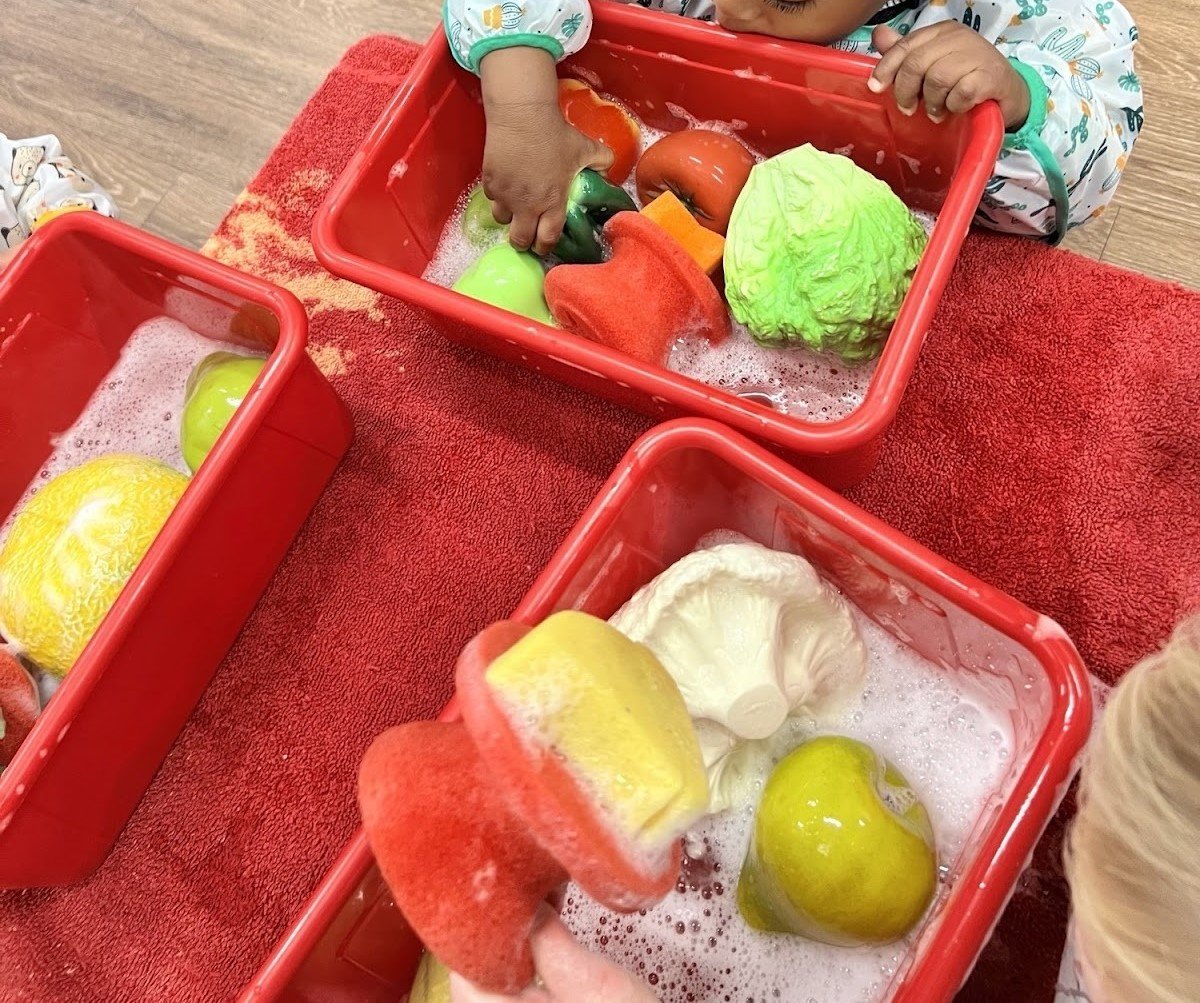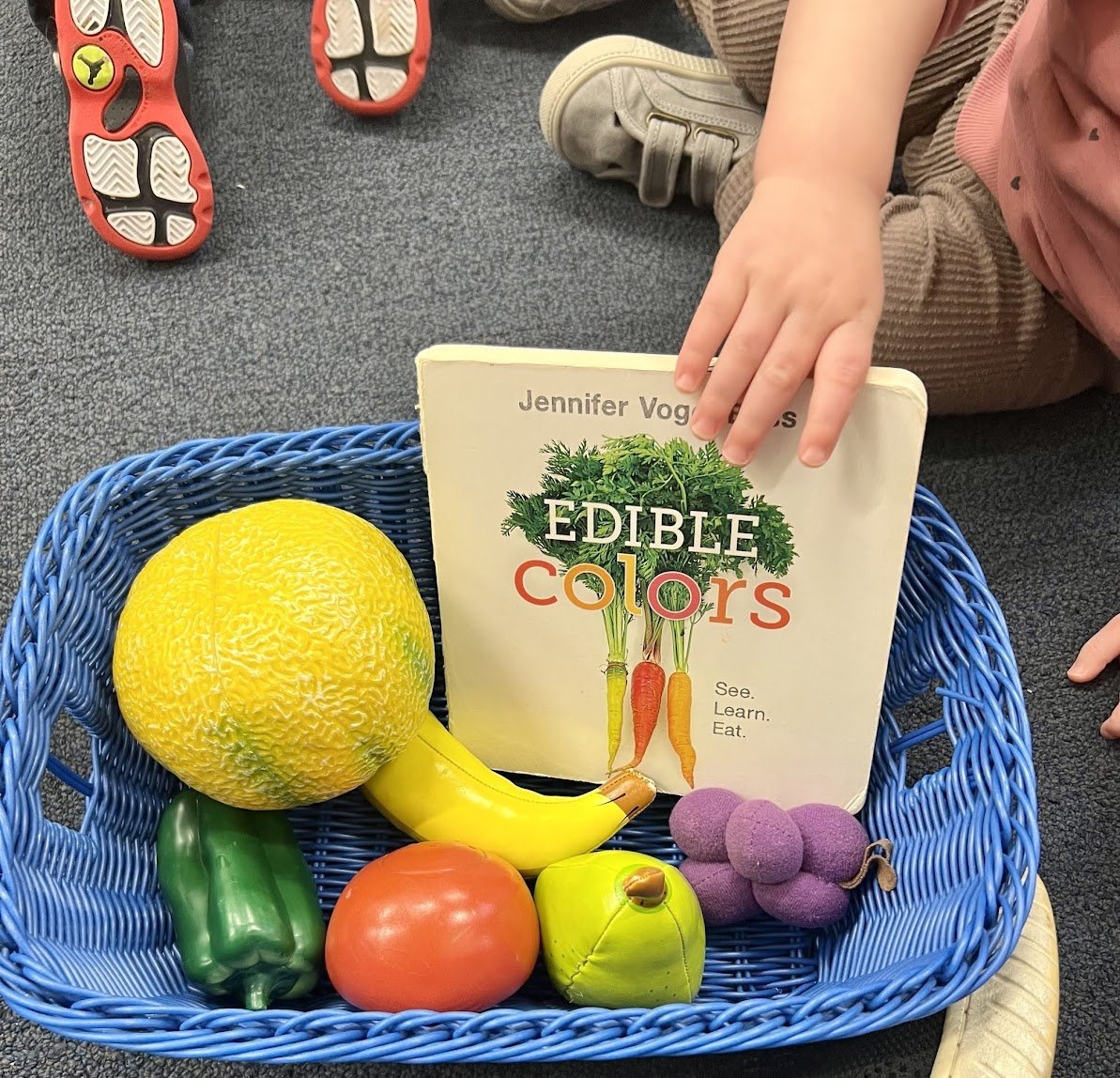New Professional Development Series Focuses on Early Language and Literacy Development
News from our Learning Lab: Inspiring Best Practices
A toddler delights in turning the pages and exploring a book with Marie Marks. Early literacy and language development begins in the first three years and is linked to shared experiences with books and stories.
Instilling a love of learning starts early -- at birth -- and Marie Marks, Early Childhood Coordinator, recently hosted an emergent literacy program designed specifically for infant and toddler teachers.
Funded by the Lawrence J. and Anne Rubenstein Charitable Foundation, the emergent literacy program highlighted the role of positive teacher-child relationships in supporting infant and toddler learning. Twenty teachers from nine centers* completed the program, earning 4 PQAS hours, one-on-one technical assistance sessions, and stipends for literacy materials for their classrooms.
"With the understanding that early language and literacy skills begin at birth, we are incredibly intentional in how we interact with infants and toddlers and set up their learning environment. We lovingly share stories, explore books, narrate actions, sign, sing, and talk with children throughout the day. Especially important, we engage families as our educational partners," says Ms. Marks.
A hallmark of our professional development program is peer-to-peer learning, with participants sharing experiences, challenges, and successes. "I couldn’t be more inspired by the infant and toddler teachers who enrolled in the course as well as Children's Village's teachers who provide quality interactions each day," says Ms. Marks.
A Closer Look at Our Approach
Inviting Children to “Tell the Story”
Teacher Marbella Trujillo-Hernandez sits on the floor with toddlers during story time. "Making eye contact -- while always important -- takes on even greater significance when wearing masks. Children miss our smiles and full facial expressions. Eye contact and welcoming body language help children feel loved, comfortable, and cared for," says Ms. Marks.
How teachers share a story is also significant. Ms. Trujillo-Hernandez engages children by pausing at the end of a sentence and any other familiar part of the story to see how the children answer. Such prompting invites the children not only to listen but also to tell the story. This approach develops comprehension skills.
Playing a Role: The Learning Environment
While a caring teacher-child relationship is paramount to learning, the classroom environment also contributes. High-quality learning environments include developmentally appropriate materials to support early vocabulary and reading skills
With books within reach, toddlers transform their cardboard 'carts' into comfy reading nooks! "Typically, the toddlers in this classroom enjoy being pushed along the floor in their 'cart box,' either by a teacher or a classmate, which is a joyful big body play activity. On this morning, however, both children hopped in the carts and instead used them as a 'book box.' The teacher played relaxing music and the toddlers enjoyed exploring a variety of books that they had selected from the classroom library," explains Ms. Marks.
"Toddlers enjoy choosing books from the classroom library and turning pages at their own pace," says Ms. Marks. Furniture scaled to young learners allows toddlers to settle into a cozy spot with their books.
Assistant teacher Ann Ng joins an infant on the floor to share a book, running her finger along the words as she reads them. She also creates voices for different characters to make the story come alive.
Engaging All Senses to Encourage a Love of Learning
Infants look, smell, hear, taste, and touch their way to understand the world around them. To foster such sensory learning, teachers encourage active, hands-on exploration.
"Allowing young children to hold -- and mouth -- board books -- helps infants gain important book handling behaviors," says Ms. Marks.


Combining Books with Sensory Experiences
(Above) Pairing books, such as The Very Hungry Caterpillar, with sensory learning experiences, including washing toy fruit that appeared in the book, enhances early literacy skills.
Using Props in Language Development
'Props' can reinforce what children are seeing in books. For example, toy fruit help children learn fruit names and often prompt the children to act out the story as they pretend to eat the fruit.
Expanding Our Reach to Lift Program Quality for More Children
"Emergent language and literacy build upon each other and set the stage for a lifelong love of learning. I am so proud of staff members like Marie for leading professional development training and ensuring that educators from the region broaden -- and share -- approaches to best serve the children entrusted to their care. We could not do so without our supporters, including the Lawrence J. and Anne Rubenstein Charitable Foundation. Together, we are elevating the quality of early education for more children, many from low-income families and from far beyond the walls of Children's Village," says Mary Graham, Executive Director.
For information on Children's Village Learning Lab, contact Mary Graham.
For information on the Infant and Toddler Programs, contact Marie Marks.
*Centers Participating in the Emergent Literacy Program
To learn more, click on the program name!
Paley Early Learning Center (Federation Early Learning Services)
Participants shared ideas on ways to repurpose well-loved, 'books that are beyond repair,' such as using the illustrations to create a mobile.







